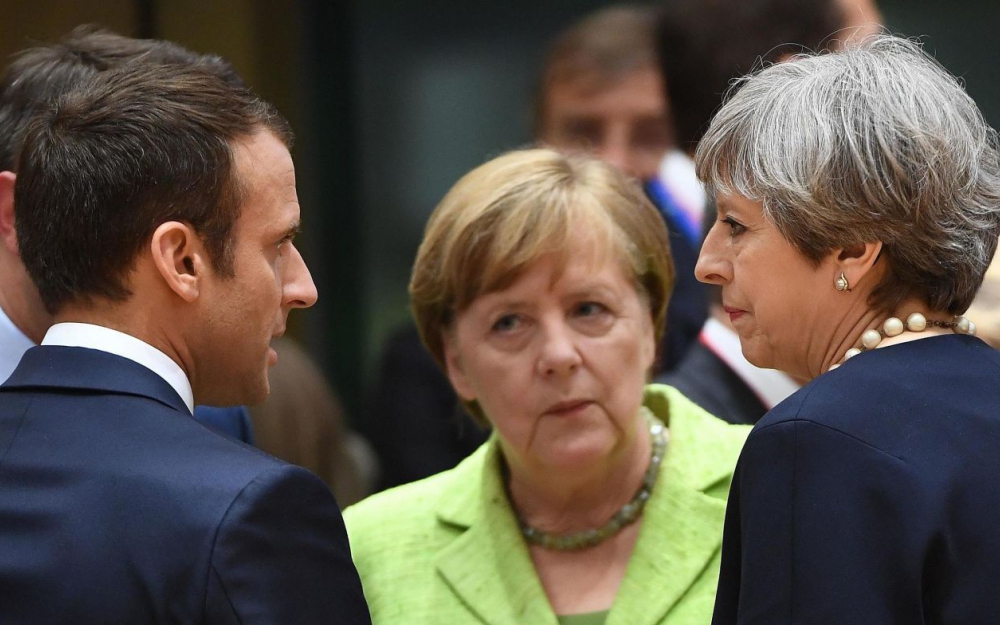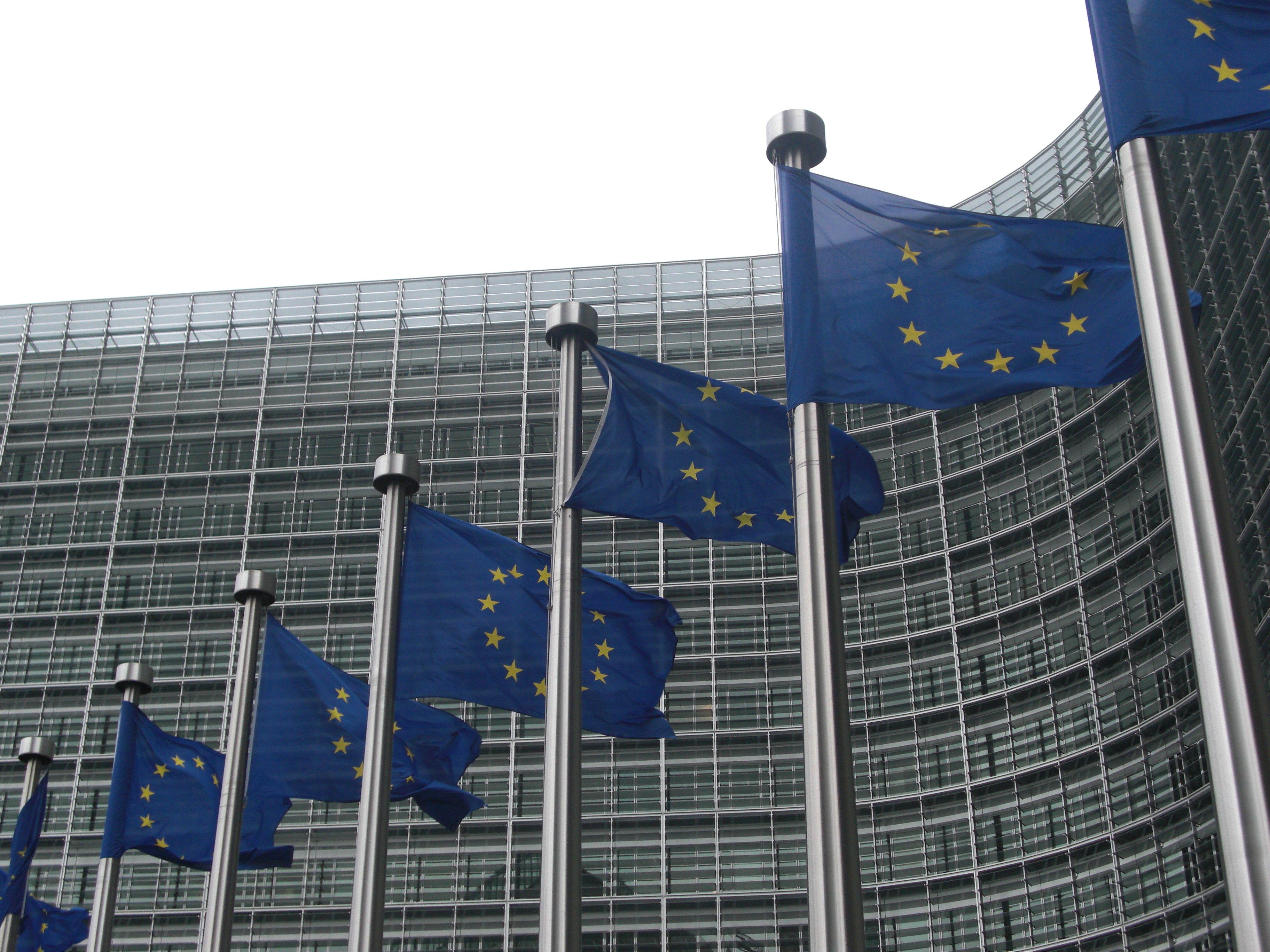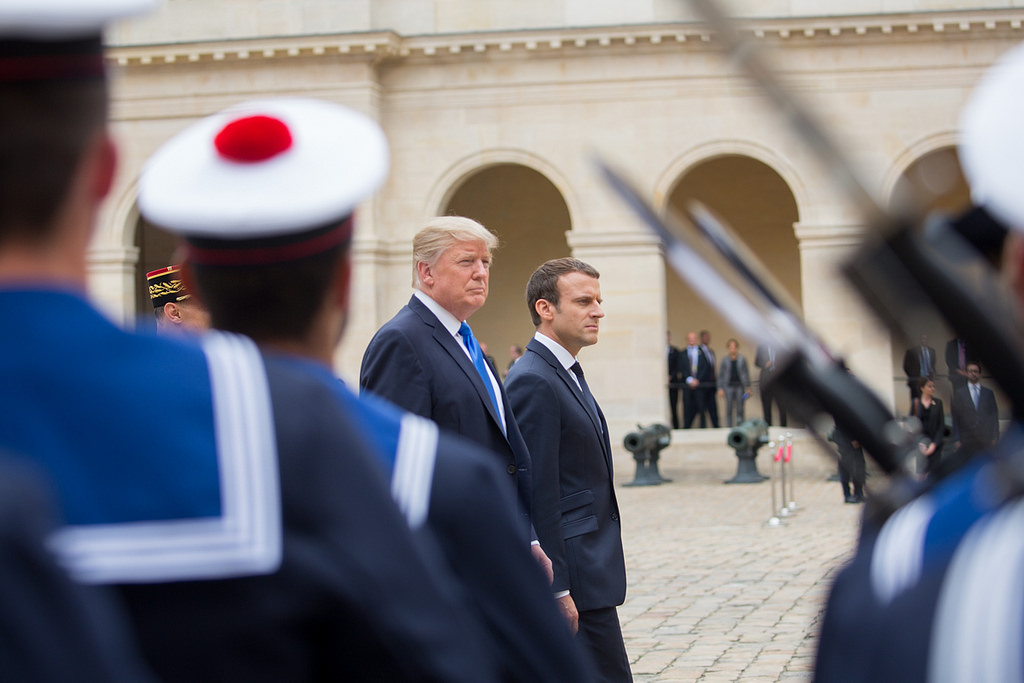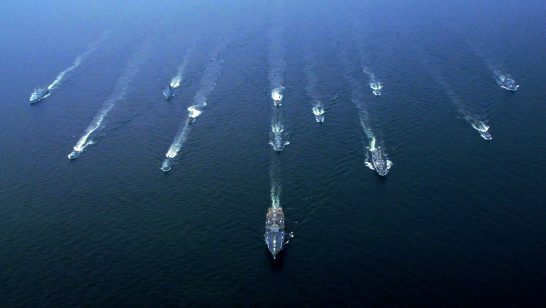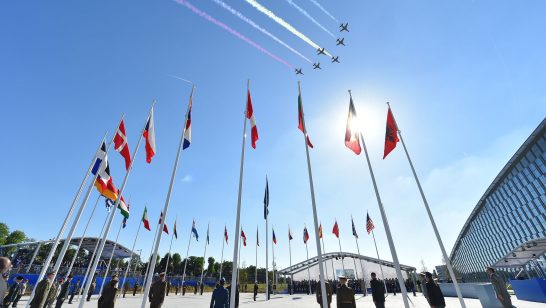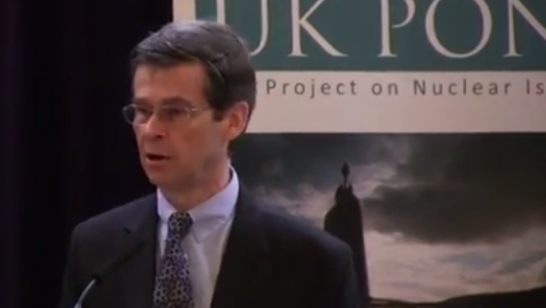
How we frame a problem does much to determine how we address it. There isn’t a security order. There isn’t even a new normal. The patterns that led us to think that these things existed have been disrupted. And it is not just that ‘order’ and ‘normality’ may no longer be useful ways of framing our problems—they may be counterproductive to good policy making.
Instead, all sides of the US–Europe–Russia triangle might gain from considering what good security policy looks like in conditions of abnormality and disorder.
Security order?
Take the notion of the Euro-Atlantic security order. This is fine if it is simply a fancy way of describing whatever happens to be the current state of affairs. It is fine if it describes one vision of where we might want to get to—an ordered set of security arrangements throughout the Euro-Atlantic area. And it is fine if it is a term that seeks to defend and expand the elements of order that do exist. But the implicit proposition that there is an order to current Euro-Atlantic security arrangements does not sit well with reality.
First, as has become especially apparent since 2014, much of what we took to be ‘order’ in Euro-Atlantic security—upholding the OSCE rules of Helsinki/Paris, respect for borders, legally (or at least politically) binding arms control agreements, the deliberate absence of aggressive behaviours, and openness to dialogue—is now damaged, eroding or gone.
Second, so much of what we consider essential to our shared security now lies outside any agreed order. Whether it is how Russia treats the sovereignty of its neighbours, or how NATO behaves in Russia’s neighbourhood, or how the US and Europe relate as allies, or the emergence of destabilising but completely unregulated military technologies, or the rules for economic security, the current situation could not be described as an ‘order’. In many cases, there are not even tacit rules that might provide the sense of a security order—think of ambiguous cyberattacks or of interference (actual or perceived) in the domestic political affairs of other countries.
The idea that there is an order to be upheld is still important. For example, it is still worthwhile to insist that international law prohibits the armed invasion of other countries and the alteration of borders by force. Countries, including Russia, still explain their actions in terms of recognised rules. There is some order in important areas of security. But there is not a ‘European security order’. And at quite profound levels in our sense of security, there is no longer even an informal agreement on the rules of the game.
A new normal?
Similar points can be made about the notion of a ‘new normal’. Normal isn’t normal if it is constantly changing and disrupted. Except in the ironic sense that nothing is normal, the term ‘new normal’ may be misleading. It implies that we have moved from one fixed state into another fixed state, for example from partnership to containment in West–Russia relations. We may not like this new state and the rules that govern it, but there’s a sense that there are rules—or at least patterns—that create something with which we have become familiar: a ‘normal’.
And yet things may not be ‘normal’—even if we think we have become accustomed to a post-truth, post-fact, fast-changing Euro-Atlantic security space where rules are made to be broken.
First, maybe it really is the case that rules are being made to be broken—or at least that behaviours are being intentionally created and intentionally mutated in order to distract and disrupt the security situation so that there is in fact no fixed state, no stable ‘normal’. It has long been a standard pillar of Western analysis that Russia sees its own security interests best served through the destabilisation of others. And in our Trumpian world there are some who see disorder as also serving US security interests. A constant moving of the goal posts, new tactics, new demands and fresh disruption appear also to be a White House strategy to keep allies and opponents off balance.
Second, outside the immediate bubbles of government decision making, the wider world is increasingly generating disruptive ‘abnormals’ that affect Euro-Atlantic security. It might be the accelerating pace of Arctic ice melt. Or a spike in illegal migration flows from sub-Saharan Africa or Afghanistan. Or a new mutation of Islamist or other terrorism. Or a disruptive, and perhaps widely adopted, new technology. It is hard to feel confident that we can ever again be in a state of ‘normal’ with regards to our security.
What’s in a word?
These semantics matter. If we think that there is a European security order to be defended, or a new normal to be adjusted to, we will invest a lot of time and effort in that task rather than in figuring out how to cope with disorder and the unpredicted. If we see violations of a cherished order or disruptions of a familiar normal, we waste emotional energy in being upset by that. And we may waste political effort in trying to shore up an imagined status quo rather than in seeking new ways of coping.
This is not to argue that it is a mistake or futile to try to enforce the spirit and not just the letter of the Vienna Document, to sanction Moscow for annexing Crimea or to try to negotiate supplemental agreements on Iran with the United States. But it is an argument for seeing such steps as a means to shape disorder to our advantage rather than to put the genie back in the bottle. It is an argument about avoiding a backwards-looking nostalgia for an ordered normality. It is, above all, an argument against complacency about the security costs and dangers—for all players in the Euro-Atlantic area—of the world they now inhabit.
The Euro-Atlantic jungle
Security complacency might seem to be a particularly European shortcoming. Russia shows no signs of complacency about its security, nor the United States about its own. It is the Europeans who seem to be suffering the greatest cognitive dissonance about the new security disorder.
But it is not just Europe that has been on a 25-year security summer holiday. Some creeping de facto annexation of Georgian territory here, some expeditions into Iraq and Afghanistan there— both Moscow and Washington, like European capitals, have tended for the past two decades or more to regard military action as discretionary, or at least to see national security challenges as less than existential. All sides are guilty of complacency about their shared, mutual security.
A less complacent frame of reference than ‘order’ or ‘normality’ with which to consider the realities that all sides now confront might be to consider ourselves in a ‘security jungle’. There are multiple beasts—not all of which are governmental. There are lots of adaptive strategies for survival. Life is potentially nasty, brutish and short.
With luck, things will not be as bad as that. After all, the British bulldog did not get eaten in the Russian bear’s lair at the 2108 World Cup. Unlike most parts of the world, Europe has at least had the recent experience of negotiating security constraints. But applying a worst case scenario mind set might nevertheless now be more productive for building mutual security than attempts to construct a European security ‘architecture’ or return to some ideal status quo ante.
Three rules of the jungle
With ‘security in the jungle’ as our frame of reference, what should our guiding preoccupations be? Is it simply a matter of nature red in tooth and claw, and every beast for itself? In a real jungle, there are no written agreements. But there are embedded instincts, communities of interest, collaborative behaviours and understood codes of conduct.
The following three non-exhaustive, non-exclusive, obvious guiding thoughts are an exercise in instructive entertainment that offers a couple of conclusions.
The first rule: Attend to what other beasts do, not what they say.
This is a sad rule for a diplomat, because words really do matter in terms of predictability and trust. But the Kremlin and the White House lie, and European rhetorical fantasies are now more corrosive of security trust and predictability than they are helpful. There is so much chest thumping on security, so much populist pandering to the domestic political base, so much media hype and so many myths being propagated, both about one’s own side and about the other’s, that words—and perhaps even formal agreements—are not a good guide to what is going on.
In terms of what is going on, the picture is in some limited respects more hopeful than these inflated words would suggest. On the battlefield, where it matters to the lives of soldiers and civilians, on the ground in Syria and in the airspace above, the United States and Russia appear to have reached some rough and ready understandings and have created the mechanisms to operationalise them. In the Baltic States and Poland, where it matters for NATO’s collective security, the United States is still reinforcing, not withdrawing—despite all President Trump’s threats. On economic sanctions, where it matters as a litmus test of political will, the Kremlin has unexpectedly failed to push back against the EU on Eastern Ukraine, let alone Crimea. On NATO enlargement, crucial to Russian perceptions, the Alliance is in practice going slow on Ukraine and Georgia.
And yet, for states with good enough intelligence or analysts, it is apparent that all the major Euro-Atlantic players (among whom we should probably now include China) are playing ever less for a win-win outcome and ever more defensively, including the offensive aspects of a strong defence. There is a largely unconstrained and destabilising arms race between Moscow, Washington and Beijing. Both Washington and Moscow are plainly deterred by the risk of large-scale casualties, which continues to make them vulnerable to asymmetric approaches by lesser players. There is food for thought here for all the beasts in the jungle.
The second rule: Action invites reaction In the jungle, beasts may be rational, but they aren’t always reasonable.
If we strike at them, they strike back. And in the jungle, there are always unintended consequences.
When beasts negotiate shared access to the waterhole, very different sorts of creatures can rub shoulders side-by-side. But if one animal starts throwing its weight or its claws around, others are likely to find ways to retaliate. This applies to the security situation as well, whether it is Europeans seeking to compensate for Trump’s torpedoing of their nuclear deal with Iran, or Washington compensating for Putin’s social media interference and 1 March 2018 nuclear bluster, or the Kremlin compensating for NATO’s enlargement in the Western Balkans.
The lesson is to be very cautious about what we plan for, especially if it is likely to be seen by another beast as an offensive move. In the jungle there is much to be said for keeping your claws sharp, or your hooves strong, while keeping your head down and getting on with life. Deter, but think twice before you coerce.
The third rule: Don’t assume This rule is closely related to the second.
Don’t assume that by following the first two rules we won’t get eaten: it’s not enough just to pay attention to our adversaries and be cautious about the consequences of our actions; in order to stay alive we need to be humble about our ability to stay alive.
Don’t assume that we know what’s going on—we may be dinosaurs with the meteor about to impact, or rats with a boa constrictor silently slithering up behind. For example, Russia has historically shown an appallingly poor understanding of NATO, despite all its access to information. It would a terrible mistake if the Russian security establishment were now to assume that NATO was falling apart. Similarly, despite all their intelligence assets, the United States and its allies have shown an appallingly poor understanding of arenas like Afghanistan and Iraq—to their great cost. And Europe has arguably shown appallingly little understanding that the United States is a place where 42 percent of registered voters still give President Trump a favourable rating.
And, finally, don’t assume that we won’t get into trouble. A pack of small flesh eaters can bring down even the largest beasts. So can poisoned bait. And a small furry animal may still get stepped on, no matter how cute it might think it is.
Conclusions
This has been a light-hearted review to make some serious points. What practical recommendations flow from these ideas for decision makers?
A first recommendation is to avoid being glib or quick about choosing how to frame the security questions which most need answers. Is it adequate to ask how to maintain, restore or create an ideal European security architecture? Perhaps the metaphor is more complex and organic than that.
A second is to become much less complacent about security, for players in every corner of the Euro-Atlantic area. Will it really do to speak of a ‘new normal’ in the resigned, humorous way that Europeans do, counting the days until the end of Trump’s or Putin’s term, and hoping that things will then return to the ‘old normal’? Is it so safe for great powers to replay the Cold War, but in the 21st century, relying on military strength more than other aspects of security like economic reform or domestic investment?
A third is to be much more cautious about the consequences of our actions. Did President Erdogan really compute the economic and political costs of shooting down a Russian fighter in November 2015? Can President Putin safely assume that NATO’s reaction would be any less ferocious than his own was towards Turkey if a Russian fighter pilot gets it wrong when buzzing a US warship in the Baltic Sea or Black Sea? Can President Trump safely assume that Russia will be able to distinguish a low-yield nuclear warhead from a high-yield one if both types are deployed on US strategic missiles?
A fourth recommendation is to invest much more heavily in understanding our adversaries and security environment. This should be true for small states as well as large ones. Many states of all sizes are good at assembling information; far fewer achieve understanding; fewer still manage to make good decisions based on that understanding. Jungle animals do better.
A corollary and fifth recommendation is to invest much more heavily in security dialogue with potential adversaries as a way of navigating through the jungle. This may do nothing to change their minds, but it will at least improve our understanding of the situation. And it may open more possibilities for mutually beneficial negotiation.
A sixth and final recommendation—at the risk of straining the metaphor too far—is to respect and draw on the jungle’s ecology. It may be a jungle, but it’s still our jungle. If we burn it down, everyone suffers, including ourselves. The Euro-Atlantic jungle may harbour many big beasts and most of the world’s nuclear weapons, but it also has unparalleled natural reserves of history, diplomacy, practice and agreements to draw on for the sake of mutual security.
These are very general recommendations, but they are entirely practical ones. We are at a stage in the life of our jungle where no witch doctor’s magic charms will deliver greater security. Only the patient application of a changed approach to our security ecology and its sustainability will make things less costly and less dangerous.
This article was first published in the Riga Dialogue Afterthoughts 2018 by the Latvian Institute of International Affairs
The opinions articulated above also do not necessarily reflect the position of the European Leadership Network or any of its members. The ELN’s aim is to encourage debates that will help develop Europe’s capacity to address pressing foreign, defence, and security challenges.

